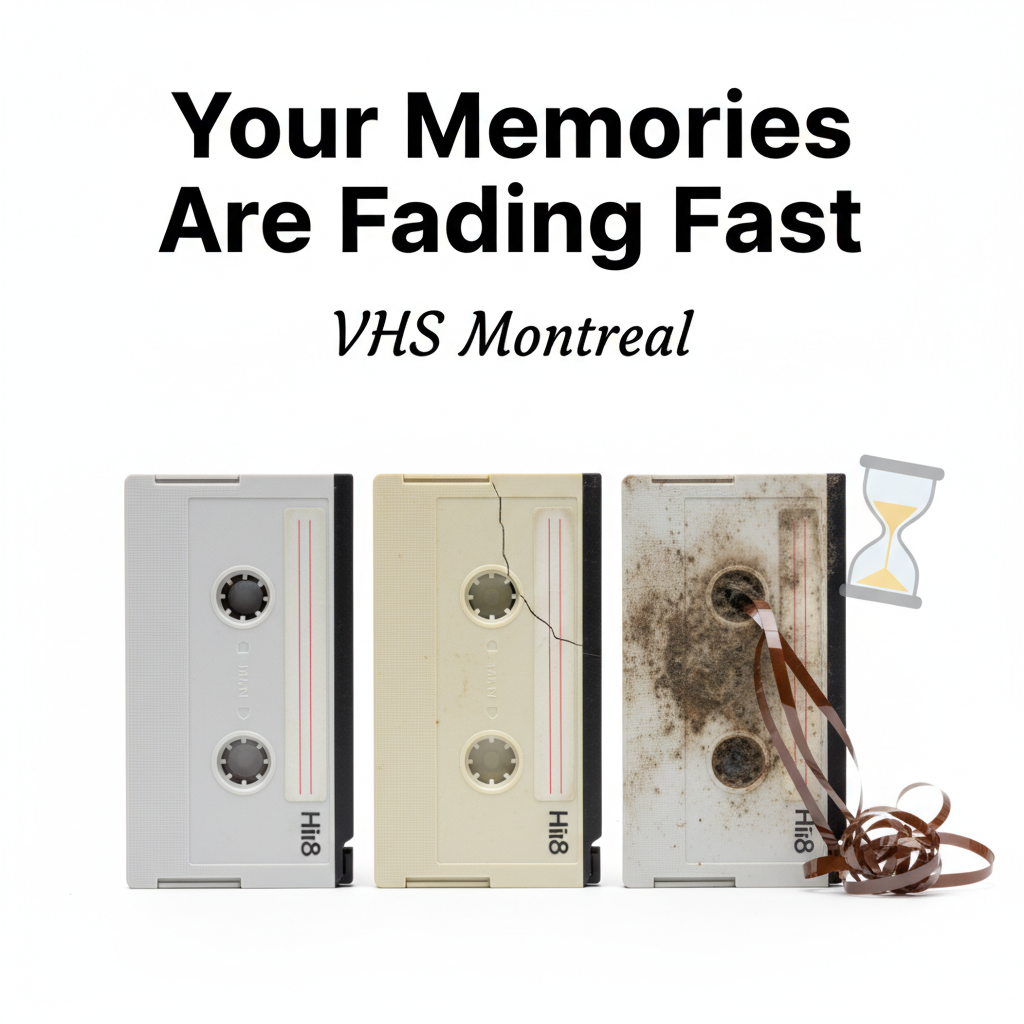
Your Memories Are Fading Fast | VHS Montreal
Share
Stop the Clock! Your Hi8 and 8mm Tapes Are Fading Fast—Here’s What to Do
We know you have those tapes. Tucked away in a basement or attic closet are the irreplaceable moments of your life: birthday parties, first steps, family vacations, all captured on Hi8 and 8mm tapes.
If those memories are 20, 25, or even 35 years old, we have an urgent message for you: Your tapes are dying.
At vhsmontreal.com, we see it every day. The magnetic media that holds your precious footage has a critical shelf life, and for most Hi8 and 8mm tapes, that window is only about 10 to 25 years under normal storage conditions. If you wait any longer, you risk permanent, unrecoverable loss.
The Realistic Lifespan of Your Tapes
While film archives have ideal, stable conditions, the reality of home storage is harsh. Your tapes are constantly battling two enemies: time and environment.
-
Chemical Decay (Hydrolysis): The magnetic particles on your tape are held together by a binder. Over decades, especially when exposed to heat and humidity, this binder breaks down through a process called hydrolysis. This leads to:
-
Dropout: Permanent loss of picture and sound quality.
-
Stickiness and Squeal: The tape becomes sticky, causing it to drag, squeal, or stop altogether during playback. This can permanently damage the tape and your vintage playback equipment.
-
-
Equipment Failure: Even if your tapes are pristine, your original camcorder or VCR is a ticking time bomb. Belts, capacitors, and tiny mechanical parts are failing globally, making functional 8mm/Hi8 players increasingly rare and expensive to repair. If your last working camera dies, you lose your last chance to play the tapes yourself.
Telltale Signs to Prioritize Your Transfers
Don't wait for total failure. Here are the red flags that mean your tapes need to be digitized immediately:
-
Visible Mold: If you see any white, dusty, or fuzzy spots on the tape or cassette shell, isolate it right away! Mold can ruin the tape and contaminate your playback machine.
-
Sticky Tapes/Squealing Sounds: If you attempt playback and hear a squealing noise or the tape stops intermittently, the binder is deteriorating. Stop playing it immediately and seek professional help.
-
Poor Storage Conditions: Tapes stored in a damp Montreal basement or a sweltering attic are at the highest risk for accelerated decay and warping.
Our Simple Workflow to Rescue Your Memories
The good news is that these tapes can be saved! At vhsmontreal.com, we specialize in the delicate, high-quality transfer of all analog video formats, including Hi8, 8mm, Digital8, and VHS.
Our process ensures your memories are preserved for generations to come:
-
Professional Inspection & Preparation: We carefully inspect every tape for damage like mold or breaks. Damaged tapes are expertly repaired before transfer to ensure the best possible playback and protect our equipment.
-
High-Quality Digital Transfer: We use professional-grade hardware to convert your footage into modern digital files (typically MP4) for the highest fidelity.
-
Convenient Digital Delivery: Receive your new digital memories on a USB key or via secure online download, making them easy to view on any TV, computer, or phone, and simple to share with family.
-
Preservation: We emphasize the best practice for long-term safety: maintain at least two digital backups—one local and one cloud/off-site.
Time is the most valuable factor in preservation. Don't let another season of Montreal humidity or another decade of storage steal your precious past.
Ready to Preserve Your Hi8/VHS Tapes?
Get a free quote today and let the experts at vhsmontreal.com secure your family history before it's too late.

